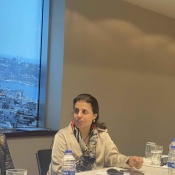Lancet Palestinian Health Alliance (LPHA) meets in Jordan and Birzeit Campuses
On 7-8 March 2016, the seventh annual Lancet Palestinian Health Alliance (LPHA) conference focusing on the “Health of Palestinians inside and outside the occupied Palestinian territory” was convened in Amman, Jordan. The conference was jointly organized by the Institute of Community and Public Health (ICPH) at Birzeit University and the Faculty of Health Sciences at the American University of Beirut (AUB) in collaboration with the Lancet Palestinian Health Alliance. It was hosted by Jordan University of Science and Technology (JUST).
The Conference opening session included welcoming remarks from the organizers and host beginning with Dean of the Faculty of Health Sciences at the American University of Beirut Dr. Iman Nuwayhid; President of Birzeit University Dr. Abdullatif Abu Hijleh; and Vice President on behalf of Dr. Mahmoud Alsheyyab Prof. Ahmed Elbetieha, President of Jordan University of Science and Technology. Conference presenters came from the occupied Palestinian territory (West Bank and Gaza Strip),Europe, Jordan, Lebanon, Qatar, Syria, and the U.S.
Immediately following the Amman conference, a special policy session was held at Birzeit University on March 10, 2016. The session aimed to engage speakers who had presented in this and previous LPHA conferences, panelists with experience in health and health care in the oPt, and the professional and practice audience attending the session in a discussion of how to link research results to policies and interventions.
The conference was opened by Abu Hijleh, and Director of the Institute of Community and Public Health. Dr. Niveen Abu Rmeileh,
“This conference has been designed to accomplish three goals,” said Abu Hijleh. “We want to collectively discuss ways to strengthen the health sector in Palestine, identify tools and resources to make these efforts successful, and address concerns related to the current and future of public health in Palestine.”
Speakers included professionals from the Palestinian Ministry of Health, officials from the United Nations Relief and Works Agency in the West Bank and the World Health Organization in the West Bank and Gaza Strip, members of the Palestinian Legislative Council, representatives of Maqassed Hospital, and academics from Al Quds University and Islamic University in Gaza.







